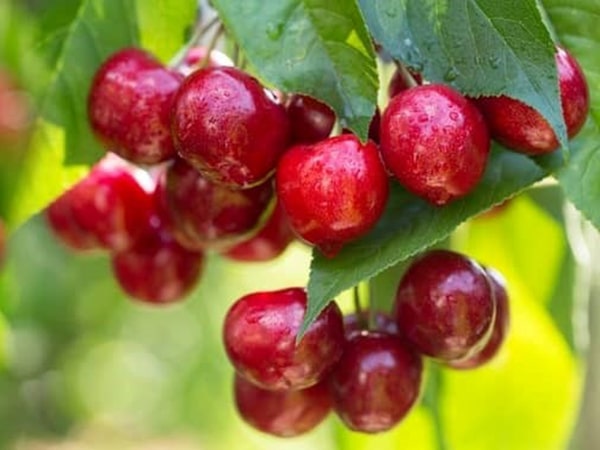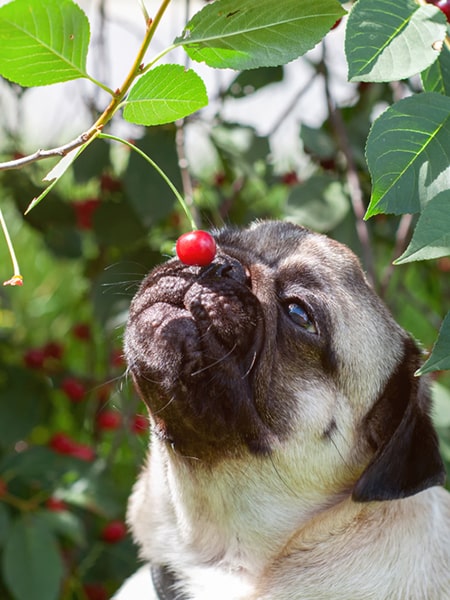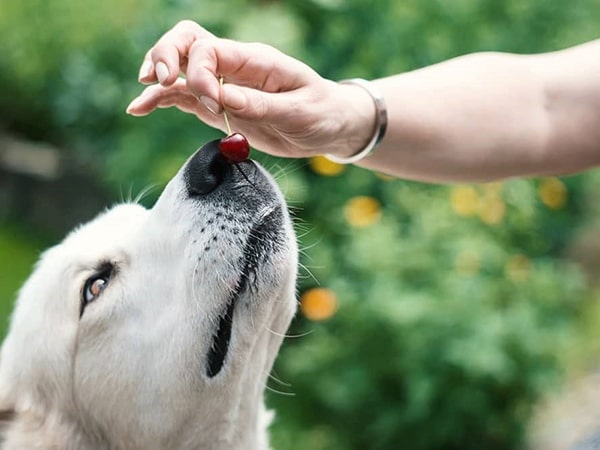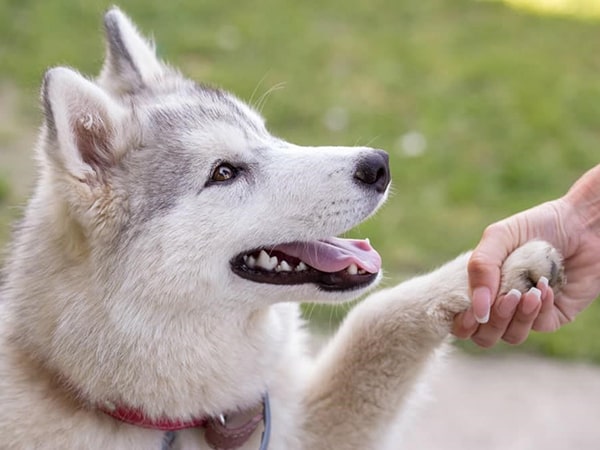This post is also available in:
Français (French)
Español (Spanish)
Can dogs eat cherries?
Cherries are a delicious and nutritious fruit that is enjoyed by many people. However, not all fruits are safe for dogs to eat. In this article, we will discuss whether or not dogs can eat cherries, and the potential risks and benefits associated with feeding them to your pup.
We will also explore the nutritional value of cherries for dogs, and provide some safe alternatives to cherries that you can give your dog as a treat. By the end of this article, you will have a better understanding of whether or not cherries are safe for your dog to eat, and you will be able to make an informed decision about whether or not to include them in your dog’s diet.
We’ll take a look at both sides of the coin so you can decide if cherries should be included in your dog’s diet.
Overview of Dog Nutrition
You may not have known, but proper nutrition is essential for your pup’s health – and that includes knowing what foods are safe and which ones to avoid. Dog diets vary depending on the breed, age, size, and activity level of the animal. In general, a healthy diet should include proteins like beef or chicken, carbohydrates like grains or potatoes, vegetables like spinach and carrots, as well as healthy fats.
Pet nutrition also needs to take into account any medical conditions such as food allergies or digestive issues. Additionally, vitamins and minerals are important components for a balanced diet in order to strengthen bones and muscles. It’s recommended to consult with your veterinarian about dietary requirements specific to your pup.
Cherries for Dogs?
It’s a common question – can pooches munch on cherries? As with any type of human food, it’s important to be aware of the safety and nutrition of feeding your pup cherries.
Here are some additional points to consider:
- The pits, stems, and leaves of cherries contain cyanide, which is toxic to dogs. Even a single cherry pit can be harmful, so it’s important to remove them completely before giving cherries to your dog.
- Cherries are a good source of fiber and antioxidants, but they also contain sugar. Dogs with diabetes or other health conditions should not eat cherries.
- If your dog does eat cherries, watch for signs of poisoning, such as vomiting, diarrhea, and difficulty breathing. If you see any of these signs, contact your veterinarian immediately.
Overall, cherries can be a safe and healthy treat for dogs in moderation. However, it’s important to be aware of the potential risks and to take precautions to avoid poisoning.
Here are some tips for feeding cherries to dogs safely:
- Only give fresh cherries, not dried, canned, or maraschino cherries.
- Remove the pits, stems, and leaves before giving cherries to your dog.
- Start with a small amount and watch your dog for any signs of discomfort.
Do not give cherries to dogs with diabetes or other health condition
Potential Benefits of Feeding Cherries to Dogs
Cherries are a good source of fiber, vitamins, and antioxidants, which can offer some potential health benefits for dogs. Here are some of the potential benefits of feeding cherries to dogs:
- Improved digestion: Cherries are a good source of fiber, which can help to keep your dog’s digestive system healthy. Fiber helps to bulk up stool and keep it moving through the digestive tract, which can help to prevent constipation and diarrhea.
- Reduced inflammation: Cherries are a good source of antioxidants, which can help to reduce inflammation in the body. Inflammation can contribute to a number of health problems, including arthritis, heart disease, and cancer.
- Boosted immunity: Cherries are a good source of vitamin C, which is an important nutrient for the immune system. Vitamin C helps the body to fight off infection and disease.
- Improved heart health: Cherries contain anthocyanins, which are antioxidants that have been shown to improve heart health. Anthocyanins can help to lower cholesterol levels and reduce the risk of heart disease.
Reduced cancer risk: Cherries contain antioxidants that have been shown to reduce the risk of cancer. Anthocyanins can help to protect cells from damage and prevent the growth of tumors.
| Nutrient | Sweet Cherry | Sour Cherry |
|---|---|---|
| Fiber | High | Low |
| Quercetin | High | Low |
| Anthocyanins | High | Low |
| Potassium | Low | High |
| Vitamin C | Low | — High |
Precautions when feeding dogs fruits and vegetables
Here are some precautions to take when feeding dogs fruits and vegetables:
- Start slowly and in moderation. Even fruits and vegetables that are safe for dogs can cause stomach upset if they are given too much too soon. Start by giving your dog a small amount of a new food and watch for any signs of discomfort. If your dog does not have any problems, you can gradually increase the amount you give them.
- Remove pits, seeds, and stems. Some fruits and vegetables contain pits, seeds, or stems that can be harmful to dogs. These items can cause choking, blockages, or even poisoning. Be sure to remove all pits, seeds, and stems before giving your dog any fruit or vegetable.
- Cook vegetables before feeding. Some vegetables are difficult for dogs to digest raw, so it is best to cook them before giving them to your dog. This will make them easier for your dog to digest and will also help to release some of the nutrients.
- Do not give grapes or raisins. Grapes and raisins are poisonous to dogs and can cause kidney failure. Even a small amount of grapes or raisins can be harmful, so it is important to avoid giving them to your dog.
Be aware of allergies. Some dogs may be allergic to certain fruits or vegetables. If you notice any signs of an allergic reaction, such as itching, hives, or swelling, stop giving your dog the food and contact your veterinarian.
Tips for Feeding Cherries for Dogs
If you’re looking to give your pup a special treat, cherries can be a great option – just make sure to do it right! Before feeding your dog cherries, make sure the fruit is pitted so as to avoid choking or digestive issues.
Additionally, keep an eye on your dog’s appetite when introducing new foods; too much of the wrong kind of food can lead to stomach discomfort and diarrhea. To ensure your pup enjoys their special snack safely, don’t exceed one or two cherries per day depending on their size and weight.
If you notice any adverse reaction after feeding them cherries, consult with your vet immediately.
Natural treat alternatives for Dogs
Dogs need treats just as much as humans do, but it’s important to choose healthy options that are safe for them to eat. Here are some natural treat alternatives for dogs:
- Fruits and vegetables: Many fruits and vegetables are safe for dogs to eat and can make healthy treats. Some good options include apples, bananas, carrots, blueberries, and watermelon. Be sure to remove any pits, seeds, or stems before giving them to your dog.
- Frozen fruits and vegetables: Frozen fruits and vegetables can be a refreshing and fun treat for dogs. They can also help to keep your dog’s teeth clean. Some good options include frozen blueberries, banana slices, and green beans.
- Yogurt: Yogurt is a good source of protein and calcium for dogs. It can also help to keep your dog’s digestive system healthy. Be sure to choose plain yogurt without any added sugar or artificial flavors.
- Peanut butter: Peanut butter is a high-fat treat, so it should be given in moderation. However, it is a good source of protein and healthy fats for dogs. Be sure to choose peanut butter that is made with natural ingredients and does not contain xylitol, which is toxic to dogs.
- Carrots and celery sticks: Carrots and celery sticks are crunchy and satisfying treats for dogs. They are also a good source of fiber, which can help to keep your dog’s digestive system healthy.
- Beef or chicken jerky: Beef or chicken jerky can be a healthy treat for dogs, but it is important to choose brands that are made with high-quality ingredients and do not contain artificial flavors or preservatives.
- Homemade dog treats: There are many recipes available online for homemade dog treats. These treats can be a great way to give your dog a healthy and delicious treat that you made yourself.
- When choosing natural treat alternatives for dogs, it is important to consider your dog’s individual needs and preferences. Some dogs may prefer crunchy treats, while others may prefer soft treats. It is also important to start with small amounts of new treats and watch your dog for any signs of allergic reaction.
Here are some additional tips for choosing natural treat alternatives for dogs:
- Choose treats that are high in fiber and low in fat.
- Avoid treats that contain artificial flavors, colors, or preservatives.
- Start with small amounts of new treats and watch your dog for any signs of allergic reaction.
By following these tips, you can choose healthy and safe natural treat alternatives for your dog.
SEE ALSO:
- Can Dogs Eat Squash?Unveiling the Nutritional Benefits and Safety Precautions
- The Dangers of Cheesecake for Dogs
- Can Dogs Eat Kiwi
- Can Dogs Eat Peaches?Unveiling the Nourishing Delights – Benefits, Safety, and Precautions
Conclusion
You’ve heard that cherries can be a healthy snack for humans, but what about your pup? The answer is yes—in moderation.
Cherries can offer some health benefits to dogs, such as improved digestion and joint health. But they also come with risks, like the potential risk of choking or causing an upset stomach.
To ensure your dog’s safety when feeding them cherries, make sure you pit the fruit first and only give them a small amount at a time. With guidance from your vet and proper precautions in mind, feeding cherries to your pup can be a great way to add some variety into their diet.
“Adopt a Dog Today and Give Them a Second Chance at Life.”







